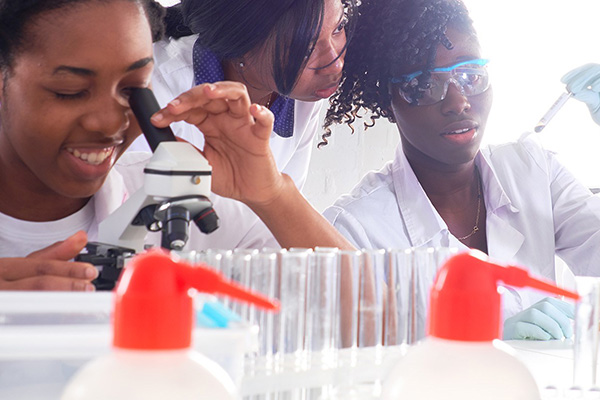Joint Editorial by Lawrence Banks, Director-General of the International Centre for Genetic Engineering and Biotechnology (ICGEB); and Jorge Chediek, Director of the United Nations Office for South-South Cooperation (UNOSSC), and Envoy of the UN Secretary-General on South-South Cooperation
Together ICGEB and UNOSSC are developing joint publications that facilitate Member States, United Nations entities, and other partners to publish and share the policies, programmes, and initiatives. The immediate focus is on strategic recovery, facilitating tackling the new challenges associated with COVID-19, while at the same time moving toward the achievement of Member States’ development goals.

Testing facility. Young African female scientists or medical students, positive energetic women, work together performing blood, nucleic acid and other medical tests on samples from Covid-19 patients.
In the spirit of solidarity and cooperation, UNOSSC, since the onset of the COVID-19 outbreak, has been lending assistance to its partners, making connections and facilitating the sharing of knowledge and best practices in response to the outbreak. This work will be strengthened through the new partnership with ICGEB.
The ICGEB laboratories constitute a strong force in the battle against Coronavirus. It operates an international network, and with other multilateral organisations, institutes and government agencies across three continents, is developing protocols and providing advice on diagnosis.
ICGEB has assisted with disease surveillance and is providing machine-time, helping to increase the number of diagnostic assays that can be run. Given the current challenges, much of the knowledge generated has been made available on-line, with open source video tutorials and support available for setting up diagnostic platforms in low resource settings. ICGEB launched a dedicated ICGEB Covid19 Resource Page on 27 March 2020. Through South-South Galaxy the resources on this platform are being shared across the UN system, among private sector partners, academia as well as think tank networks across the South.
The ICGEB is also providing protocols for pharmaceutical grade production of interferon, which in some studies has been reported to assist in COVID-19 therapy.
ICGEB scientists are working 24/7 to provide screening platforms for testing new therapeutic molecules. A great deal of effort is being placed on repurposing drugs – testing medications that are already in the clinic for possible efficacy against the virus – which avoids lengthy clinical trials and safety assessments. Today ICGEB teams in Trieste and New Delhi are working together to perform biological validations for potential therapeutic value and identify which forms of immune response provides the best protection against the virus.
ICGEB has issued a special call for research grants aiming to support research activities on COVID-19 in its Member countries, in collaboration with its own scientists. This provides a wonderful means of building capacity in some of the poorest and most vulnerable nations.
Next steps
ICGEB and UNOSSC have responded quickly to directly assist Member States during this moment of crisis.
Moving forward, in the near term on-line trainings will be organised in low resource settings (e.g. diagnostics). Cutting-edge technology without the need for expensive kits (e.g. Genome Editing) will be shared and trainings will take place in equipment maintenance. One of the major issues faced in the Global South is maintenance of donated equipment. Furthermore, many labs rely on ‘kits’ that are expensive and not readily available. ICGEB offers training manuals on performing assays without the need for a kit, constituting a cost-effective, capacity-building, ‘home made’ approach.
Together ICGEB and UNOSSC will collaborate on the generation and sharing of frontier research and evidence on contribution of science, technology and innovation to sustainable development.
ICGEB and UNOSSC will also work collaboratively to organize joint fellowships, under for example the SMART Fellowship Programme, where we aim to expand our capacity to promote exchange between scientists in the Global South, while also addressing gender parity.
ICGEB and UNOSSC look forward to working with all partners to facilitate more and better scientific cooperation across the life sciences.
#ICGEB #SouthSouthCooperation #TriangularCooperation #DevelopmentCooperation #Covid19
